
# 241
November 26, 2004
In this issue:
UNITED NATIONS DEVELOPMENT PROGRAMME (UNDP)
- HIV/AIDS Prevention: NGOs of Central Asia joined to fight with epidemic
- HIV/AIDS Prevention among Uniformed Services in Kyrgyzstan – Example to Central Asian Countries
- UNDP Activities Through the Prism of Media: On the Way to Genderstan
UNITED NATIONS DEVELOPMENT PROGRAMME (UNDP)
HIV/AIDS Prevention: NGOs of Central Asia joined to fight with epidemic
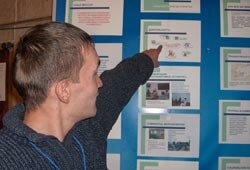 On 15-16 of November 2004, the conference “Regional initiative of the AIDS service NGOs of the Central Asia” took place in Dostuk (Friendship – in Russian) hotel in the capital of Kyrgyz Republic. On 15-16 of November 2004, the conference “Regional initiative of the AIDS service NGOs of the Central Asia” took place in Dostuk (Friendship – in Russian) hotel in the capital of Kyrgyz Republic.
For the first time representatives of more than 50 NGOs of the Central Asian region, who aimed to fight AIDS gathered together. Conference was initiated by the Association of AIDS service NGOs AntiAIDS with assistance from UNDP HIV/AIDS Programme in Kyrgyzstan. Besides, financial support to participants from Turkmenistan, Tajikistan and Uzbekistan was provided by the offices of UNDP, Global Fund and UNFPA of these countries.
Main goal of the conference was to present new regional initiative which will allow all NGOs to unite, develop an action plan for coming years and finding new unique approaches to important issues, including assistance to new NGOs.
Jerzy Skuratowicz, UNDP Resident Representative noted in his speech that regional partnership of NGOs is an important step in resistance to the epidemic in Central Asia.
During the conference representatives of each country conducted presentations on their activities and discussed experience and role of the NGOs in HIV/AIDS prevention. Also participants talked on issues that are common for NGOs of the region and further perspectives.
Agenda of the conference included a dialogue with representatives of the donor organizations as well. Representatives of the World Bank, UNODC and DFID, answered large number of participants’ questions.
On the second day of the conference participants focused on more practical aspects of activities. Representatives of NGOs discussed goals and objectives of the regional association and legal base for its registration. In the working groups participants worked on strategic plan of the network development.
Also the agenda of the second day included site visits to legal clinic “Adilet”, NGO “Sotsium” and virtual space – 15 participants logged in to http://www.volvox.in.kg. During the conference participants discussed the possibility of development of AIDS-Service NGOs network activities, particularly, the extension of Volvox project to all the countries.
“I will not keep silent anymore” – young man living with HIV told to journalists. He and five of his friends received opportunity to openly talk on what they feel and think about treatment and support as well as their future. This is how the conference of Central Asian NGOs devoted to the Regional Initiative on Development of an HIV/AIDS NGO Network ended.
HIV/AIDS Prevention among Uniformed Services in Kyrgyzstan – Example to Central Asian Countries
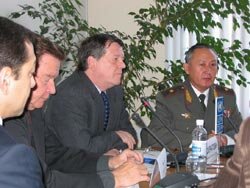 The round table on “HIV/AIDS prevention among uniformed services” took place at the UN House in Bishkek on November 17-18, 2004. The round table on “HIV/AIDS prevention among uniformed services” took place at the UN House in Bishkek on November 17-18, 2004.
Jerzy Skuratowicz, UNDP Resident Representative, Olavi Elo, UNAIDS Regional Coordinator, Ashirbek Bakaev, major general, commander of Internal Army of Ministry of Internal Affairs of Kyrgyz Republic, Boris Ugai, deputy Minister of Defense and other representatives and decision makers of uniformed services participated at the meeting.
The decision makers underlined the importance of the project. “Relatively low prevalence of HIV/AIDs in the country should not stop us. We have a good chance to stop the epidemic” – noted Ashirbek Bakaev, major general.
The aim of the meeting was to familiarize participants with the current and future activities of the joint project on “Development of HIV/AIDS prevention programmes among uniformed services” being implemented by UNDP/UNAIDS and the Government of KR. Besides, officers developed mechanisms of coordination of uniformed ministries and agencies on the issues of HIVAIDS prevention.
The main result of the round table was the agreement on the work plan for nearest months. Participants also agreed to develop a manual on HIV/AIDS prevention among military personnel.
Now, the assessment is being conducted on the level of awareness on HIV/AIDS among the staff of the ministries and other state departments. Also, series of workshops are being held on pre and post examination psychosocial consultation for medical personnel.
Closing the round table meeting, Olavi Elo said, “This project, in which all the uniformed ministries and departments participate and cooperate, is a unique experience which can be distributed in other countries of Central Asia”.
For more information, please contact: Ekaterina Paniklova, Programme Manager, UNDP HIV/AIDS Prevention programme or Ashir Chikeev, Information/Communication Specialist, tel.: (996 312) 62-04-49, tel/fax: (996 312) 66 36 91, e-mail:
UNDP Activities Through the Prism of Media: On the Way to Genderstan
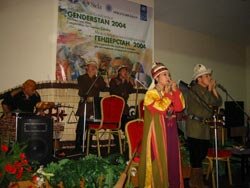 (Notes of our reporter on the international conference “Genderstan2004: Cooperation of Men and Women to Achieve Gender Equality”. The conference was held in Bishkek, the capital of Kyrgyzstan on November 1-3.) (Notes of our reporter on the international conference “Genderstan2004: Cooperation of Men and Women to Achieve Gender Equality”. The conference was held in Bishkek, the capital of Kyrgyzstan on November 1-3.)
That’s a country – country of harmony – alas, the fictitious country for the time being. Adults have plaid this game with pleasure.
The game called “Genderstan” was plaid not only by ordinary adults, but also the ones having real authority and influence on the society. The magistracy, members of different parties, NGO leaders, representatives of authoritative international organizations… And what is the sense of it all? Personally to me, this event in Bishkek was one the rare cases, when the topical gender issues were posed not as the indicators of “W” or “M”, but as the problems of the whole mankind.
Men
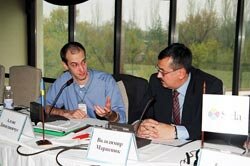 Seems, on a hunch, we always feel that our domination in a certain area makes as vulnerable in the other. If you are stronger than me in politics, darling, then in private affairs I can surely catch up with you… One may certainly consider publicity more important than private life and success in public work – more important than that in a family. But is this right? Or is this right for all? This very stratum of discussions on men’s problems seemed to be the most interesting to me. Quite to the point, in the sections of “Modern Fathers” and “Men and Crisis” the speeches had respective headlines, such as: “How Can a Politician Promote the Initiative of “Training for Dads”?”, “Personal Experience of Fatherhood”, “How is the Education Given by Mother on one Hand and by Father, on the other Hand, Reflected on a Child?”, “Changes of Men’s Gender Role in Modern Times”. Seems, on a hunch, we always feel that our domination in a certain area makes as vulnerable in the other. If you are stronger than me in politics, darling, then in private affairs I can surely catch up with you… One may certainly consider publicity more important than private life and success in public work – more important than that in a family. But is this right? Or is this right for all? This very stratum of discussions on men’s problems seemed to be the most interesting to me. Quite to the point, in the sections of “Modern Fathers” and “Men and Crisis” the speeches had respective headlines, such as: “How Can a Politician Promote the Initiative of “Training for Dads”?”, “Personal Experience of Fatherhood”, “How is the Education Given by Mother on one Hand and by Father, on the other Hand, Reflected on a Child?”, “Changes of Men’s Gender Role in Modern Times”.
The issues of legislative, institutional, and media possibilities for promotion of gender equality, both hypothetic and already tested, were also discussed at the conference. Along with the Kyrgyz office of United Nations Development Program (UNDP), Swedish Agency for International Development (SIDA) and Government of Kyrgyzstan, the Swedish NGO called “Sprunbredan” was also one of the organizers.
Therefore, the discussion often centered round the experience of this country. Gender experiences of the men from other countries – Sweden, the Ukraine, and Lithuania – were exotic and sometimes even shocking for the Asian men.
“Pain” – was the key word in a speech of a Lithuanian expert. How is it generated – men’s pain? Where does it come from and how is it transmitted from private life to society – what is its relation to the problems of men’s aggression and violence, depression, premature death, suicides… As a result of these complex links, not fully understandable and often catatonic – weakened, depressed and apathetic, socially mal-arranged society, where pain gives birth to pain, domination in one sphere leads to discrimination in the other and where this chain reaction is irretrievable.
Maybe, it is the gender approach that can stop this process? I always thought that real “genderologists” from amongst men could be perceived as social “Decembrists” – the best representatives of the dominating class, the messengers of courage and gender equity. At the conference, one could come to the conclusion that men too are looking for some utilitarian concepts in “gender”, such as protection, insurance and equity. On this basis, much easier than on the basis of antagonisms, the two genders could find a common language.
Interesting men’s experiences were brought from the Ukraine, where the programs of “Oleg”, “Olga and Oleg”, “Man SOS” and Men’s Crisis Centers are being realized. Information from Lithuania and Sweden were also very interesting…
While listening, I was recalling my talk with my colleague from Azerbaijan. On the eve of my departure to Bishkek we had a talk with Zaur Babaev, representative of National University of Baku. The discussion was about a strange phenomenon of “Caucasian Man”, which looks as if there is a certain façade, but inside, something has gone wrong long time ago. And who knows whether it ever went right – whether this stereotype ever corresponded to reality? And now, what is going on with our Caucasian Eagles? What are the transformations that “the Caucasian Manhood” has been going through after the years of economic crisis, wars and total criminality?
In a word, the international men’s network presented at the conference has undoubtedly good basis for development due to those clear practical objectives that it strives to achieve.
Women
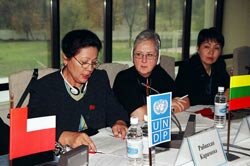 What about women? In Kyrgyzstan as well as in other post Soviet countries, women came to “gender” earlier than men, and they already feel at home. Whatever you may say, the “women block” of gender problems are more visual, if we could put it this way. Women are generally more visual. And stronger too… You can’t miss a black eye, as you can’t miss the absence of women in parliament. Especially as woman today talk a lot about these facts. What about women? In Kyrgyzstan as well as in other post Soviet countries, women came to “gender” earlier than men, and they already feel at home. Whatever you may say, the “women block” of gender problems are more visual, if we could put it this way. Women are generally more visual. And stronger too… You can’t miss a black eye, as you can’t miss the absence of women in parliament. Especially as woman today talk a lot about these facts.
A Kyrgyz woman (as well as Ukrainian, Georgian or Kazak one) is still quite far from real equity with the men. On one hand, the situation in the cities of the country is quite strange. A lot of women have immigrated to other counties in search of jobs and have left their men at home with children. On the other hand, this civic deed of hers has not been acknowledged by the society (would be great, if ever acknowledged by the family!). What do I mean? Woman is already “big” enough to start on a difficult and dangerous journey, to support a family in extreme conditions, but for the society, she is still an inadequate parliamentarian or senior management leader…
As for politics, not only that the path to it has not become any easier for the Kyrgyz women despite all the governmental decrees and declarations issued about it, but it has become even more difficult. The matter concerns the election deposit that should be paid by the candidates at all election levels. First of all, you need to find this money and then to overcome 15% barrier at the elections in order to give this money back. Alas, the new rules play against women.
Journalists
When meeting Kyrgyz journalists (men and women) you clearly realize that they are well trained in gender issues! UN, OSCE and other international organizations have actively worked with the journalists of the country for the last couple of years. There is high level of awareness and in most cases the basic concepts are sound and well-founded.
Kyrgyz journalists are sociable, hard-working and talented. What they lack is the team spirit to my mind. When we talked about it, people could not get my point at once. “What do you mean?” they used to ask, “you need some material – I will send it, you invite me to a conference – I will attend, the newspaper has to be monitored – I will do that as well. What else?”
However, I meant something very definite – I was trying to understand how the gender journalists could cooperate within the framework of certain project or on a scale of national media campaign. It is here that I see a problem – the problem of building a real team out of competing (what to do, such is the profession!) writers – the team of people working in the same direction. How else can we make any changes happen?
Genderstan is somewhat far away, but so near!
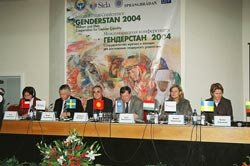 I have a kind of method to identify the effectiveness of the conferences, which I happened to participate in. The method is not undisputable, but – efficient. I consider the conference fruitful (at least for myself) if: I have a kind of method to identify the effectiveness of the conferences, which I happened to participate in. The method is not undisputable, but – efficient. I consider the conference fruitful (at least for myself) if:
-
My notebook gets thick of notes and new visit cards, and there are none of mine left,
-
If I get tens of e-mails all from new e-mail addresses upon return,
-
If there are a lot of new plans and even the whole new trends in the work ahead
In the present state of affairs, all these are in place! – And I suspect this is true for other colleague-participants of the conference as well. Hence, even if the three days in Bishkek have not shaken the world, they have substantially pushed it ahead. And even though, the claimed Genderstan as a community of social harmony is far ahead the day after tomorrow, the way to it runs through today.
Galina Petriashvili, Journalist Association “JenderMediaCaucasus”, Tbilisi, Georgia. Published by the site: www.owl.ru
|

